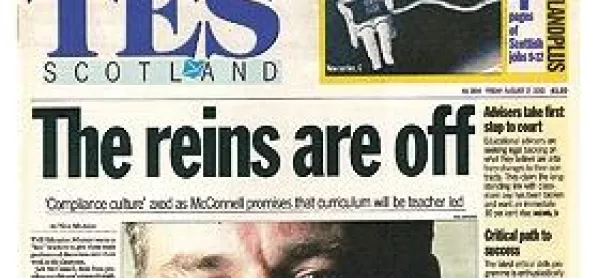Looking back on steps we took forward and back

The first leader I wrote as editor, on June 1, 2001, was on the subject of class size. It declared: “The issue is what the limit should be.” How things have moved on!
My period in the editor’s chair has coincided, more or less, with the first decade of the Scottish Parliament. Has it made any difference (I mean the Parliament!)?
An unprecedented bounty of cash for education during the years of plenty has proved, alas, to be the exception rather than the rule. Virtually all my time involved with education has been characterised by cash crises, varying only in their severity, of which the current episode is admittedly the most severe.
The latter years have had the searching light of performance bonus shone on them. I refer not to that of the bankers but of the education system: where is the payback in attainment and achievement for the millions which have been spent on education since devolution?
The answer is sobering, and it is not the simplistic one of making a linear connection which expects rising expenditure to be followed directly by improving performance.
The harsh reality, nonetheless, is that Scottish education is at best average at a time when average is no longer regarded as good enough (maybe it was always so, even in the “halcyon” days, but we did not have the data to tell us).
The only consolation is that virtually all western countries, from Ireland to the United States, believe their education systems are not good enough. This is partly because they are seen to be under-performing in relation to the “Asian tigers” and western exceptions such as Finland.
But comparisons with other countries obscure as much as they illuminate: the nature of the questions in international tests can skew the results, differences in curricula matter and cultural approaches influence the nature of learning.
No, this is not really about money or results. The first striking factor about Scottish education during the past decade, and a few before that, has been its “Maoist” state of almost permanent revolution. Despite the rhetoric about “trusting our teachers” and “our teachers are among the most professional in the world”, the politicians simply could not leave them alone.
For those of us of a certain age who recall the relative calm before the exam system started to be reformed in the 1980s, the changes have been bewildering. Standard grade was to save the day, then it had to be swept away; Highers had to be revised, then moved to the exalted plane of Higher Still and then revised again to minimise assessment; 5-14 was meant to bring coherence to the education of pupils in the primary and early secondary years, then it was challenged for being too prescriptive.
It is a truism to say things cannot stand still, as education is forced to reflect changing circumstances, but much of this activity was overly frenetic and counter-productive.
“Education, education, education’ may have been the political mantra of the Blair years, made no different as Westminster gave way to Edinburgh, but the reality for schools was `assessment, assessment, assessment’. Why not, the public might ask? The problem gradually became self-evident in the lack of clarity of purpose: assessing schools, assessing teachers, assessing the system? The result was - and is - a chasm of understanding between policy-making and policy implementation.
The second striking feature of the past decade is how few issues have gone away, as the panel illustrates: the impact of assessment, the nature of the curriculum, the role of inspection, the gap between the “haves” and the “have nots”, the under-performance of boys, quandaries over school closures, the dilemmas of teacher workforce planning, the relationship between schools and education authorities (including how many there should be of each).
But The TESS has also been able to report major success stories over the past decade: the curriculum, and indeed the rest of education, is no longer the “secret garden” it once was. The next 10 years will no doubt reflect the same mix - a few steps forward and perhaps rather more than a few steps back.
2001 - deja vu?
- Education Minister Jack McConnell says the newly formed HMIE must tackle a perception that it is “a force for uniformity - a false perception perhaps, but there must be a recognition that it exists”.
- The SSTA expresses ambivalence on whether the Government would create a new climate in schools and avoid a new exams crisis.
- Scottish Executive launches a teacher recruitment drive.
- A ministerial taskforce plans a more comprehensive approach to discipline, as Mr McConnell launches his Better Behaviour, Better Learning initiative.
- Glasgow seeks to build an alternative curriculum.
- Yet another task group is set up “to find a way through the assessment jungle”.
- Teacher education faces a shake-up, “learning how to learn” being the focus.
- Alert over the need for more than 2,000 fewer teachers by the end of the decade due to falling pupil numbers.
- Rural schools are under threat of closure because of plummeting rolls, while “budget pressures force a hard look at empty desks”.
- Mr McConnell says teachers must have more professional discretion in the classroom.
- Question mark raised over the future of Standard grade.
- Scottish Executive tries to head off an EIS boycott of internal assessment in battle over Higher Still.
- Boys face “achievement ceiling”, Edinburgh University study finds.
Keep reading for just £1 per month
You've reached your limit of free articles this month. Subscribe for £1 per month for three months and get:
- Unlimited access to all Tes magazine content
- Exclusive subscriber-only stories
- Award-winning email newsletters

